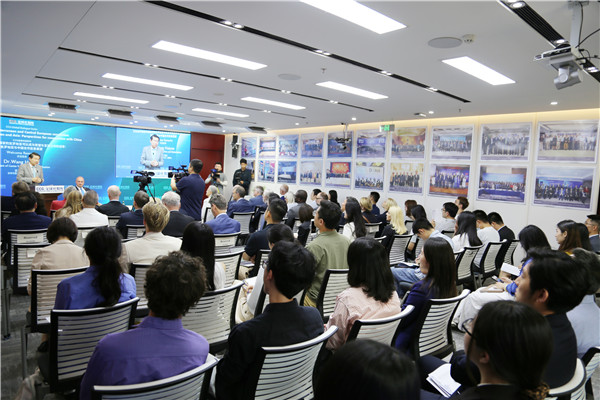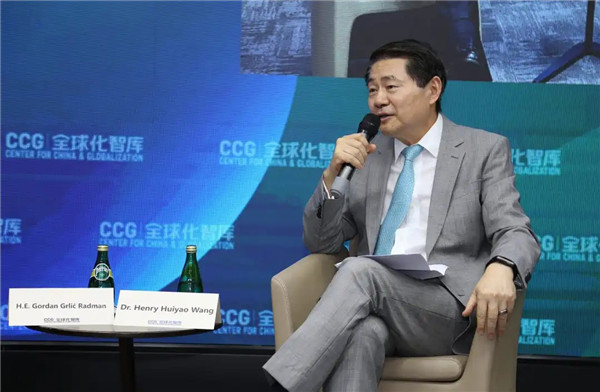Transcript: Dr. Gordon Grlić Radman at CCG
July 22 , 2025The Croatian Foreign Minister on “Croatia as a Mediterranean and Central European connection between the European Union and Asia: Perspectives for cooperation with China.”
▲ Video | Wang Huiyao in Dialogue with H.E. Mr. Gordan Grlić Radman
Dr. Radman gave a speech, engaged in a conversation with Henry Huiyao Wang, Founder and President of CCG, and answered questions from the live audience, as a part of CCG’s ongoing Global Dialogue.
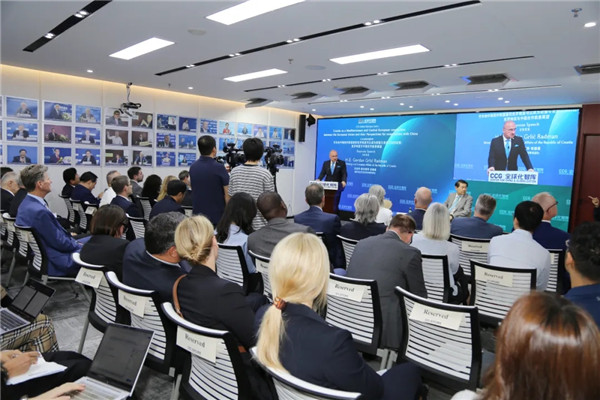
The following transcript is produced based on the video recording which has been streamed in Chinese social media by CCG and remains available. The transcript has been slightly edited for clarity and brievity. It has NOT been reviewed by the speakers.
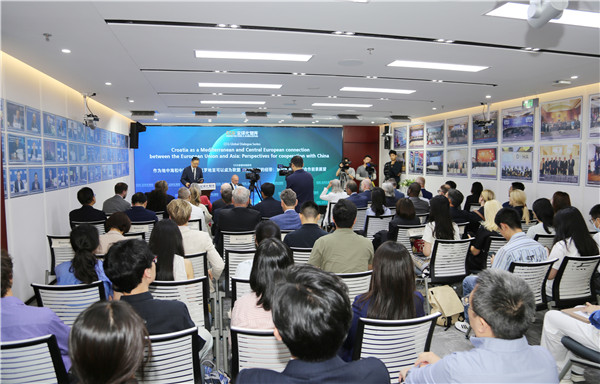
Good afternoon excellencies and distinguished guests. A very warm welcome to all of you for joining today’ s global dialogue at the Center for China and Globalization (CCG), recognized globally as China’s leading international think tank. Before opening our proceedings I am honored to welcome Dr. Henry Huiyao Wang, founder and president of CCG and former counselor to China’s State Council and distinguished professor at China Foreign Affairs University to kick off the dialogue and exchange.
The floor is yours.
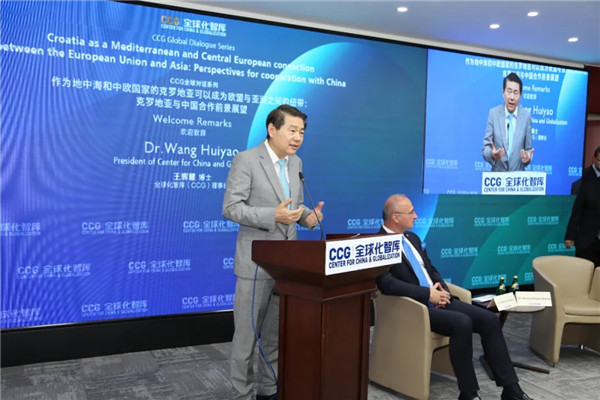
Respectfully, Minister Gordan Radman, distinguished excellencies, guests, ladies and gentlemen, so good afternoon. Thank you for all being here today, and it is a great honor to welcome his Excellency, Minister Gordan Grlić Radman, coming from Croatia, a beautiful country that I had been to two years ago. I mean, I can tell you that Croatia is a such a fabulous place. I was at Dubrovnik, attended the Dubrovnik Forum, and I saw the endless coast and it was said that Marco Polo was from there. So I was really impressed, this beautiful country.
So this year marks the 50th anniversary of China-EU relations. And of course we all know that gonna have the upcoming, the day after tomorrow, as a matter of fact, the China-EU Summit. So today’s dialogue carries a particular significance. And we see that minister Radman has come here and actually leading this focused attention of China-EU relations. So at this important juncture, so today’s exchanges are so important and relevant and highly timely and will contribute very significant and meaningful promoting of the mutual understanding and, of course, cooperation.
So as my colleague, Mr. Zhang just said, CCG is globally recognized think tank that we rank the top 100 think tank in the world a number of times. And also we hold a special consultative status by the United Nations, the only think tank in this category in China. And also we have exchanged globally and been to many places, including Croatia.
To kick off this global dialogue, you know, CCG Global Dialogue has become a brand name in the Chinese think tank… Just for the last year, for example, among our distinguished guests who have been hosting, her Excellency Ms. Tanja Fajon, Deputy Prime Minister and Minister of foreign affairs from Slovenia. We have also hosted His Excellency Hakan Fidan, Minister of Foreign Affairs of Turkey. And we have hosted his Excellency Paulo Rangel, Minister Foreign Affairs of Portugal. And we have also hosted his Excellency, Jeppe Kofod, former Minister of Foreign Affairs of Denmark. Just to give examples, for the last year, we have had many visits here. So those visits have provided invaluable opportunities for hosting deeper mutual understanding and also enhance the exchanges between China, of course, and all the countries that we have to really engaged with.
So before we start to hear minister’s important keynote speech, I would like to take a moment to acknowledge the special guests and VIP guests we have invited today. So today we have invited the diplomats from 20 countries with the help of Croatian Ambassador, His Excellency. And so I just, that one, you know, briefly mention them. They are Ambassador from Albania, Ambassador from Croatia, as I said, Ambassador from Cyprus, Ambassador of Estonia, Ambassador of Iceland, Ambassador of Latvia, Ambassador of Netherlands, Ambassador of North Macedonia, Ambassador of Norway, Ambassador of Portugal, Ambassador of Slovak, and Ambassador of Spain. So very impressive list of distinguished guests.
Not only that, we have also representatives from various embassies, including Embassy from Bosnia and Herzegovina, Embassy of Germany, Embassy of Malta, Embassy of Poland, Embassy of Serbia and Embassy of Slovenia, Embassy of Turkey and Embassy of United Kingdom. So you can see, you know, we got that probably, you know, a large number of Beijing diplomatic core here to hear minister’s speech.
But also we have invited the distinguished guests from former official from Minister of Foreign Affairs, former official from Minister of Commerce, Beijing University of Foreign Studies, the Think Tank Community, and of course global young leaders and also many other people. And also furthermore, we have, of course, we have a full house. We have, you know, almost 70, 80 people here, but we have also invited, you know, well-known media in China, from Xinhua News Agency, Global Times, Douyin, China.org, CaiJing, Caixin, Phoenix Television, People’s Daily, Beijing Daily, China Radio International, China Daily, Economic Daily, CGTN, the name goes on. So I really would like to say that this is really a great event that we are having so many participants for this gathering today at CCG…
Since they established diplomatic ties in 1992, China and Croatia have a consistent uphold mutual respect, equality and mutually beneficial cooperation. In 2005, the two countries elevate the relationship to a comprehensive partnership. And in recent years, that political trust through multiple summits and bilateral meetings has really further enhanced that. The year last year was, marked 20th Anniversary of our comprehensive partnership. Cooperation between China and Croatia has steadily expanded across trade, technology and cultural field. So it’s a great time to reflect on that. And also last year, the bilateral trade reached 2, almost 3 billion US dollars and almost 17% increase year on year. So the two sides established mechanisms such as Economic Joint Committee and Science and Technology Corporation Committee and signed multiple agreements to align Belt and Road Initiative and also with Croatian development objectives.
So I know that minister had a great productive meeting with Chinese Foreign Minister Wang Yi yesterday. And also Foreign Minister Wang Yi emphasized Croatia’s historical role as an important stop on an Ancient Silk Road. So we certainly find that is really relevant and important. And also he highlighted the 20th Anniversary of a comprehensive partnership offers an opportunity to advance bilateral relation to a new level and strengthen multilevel exchanges, multi-corporation and promote stable and healthy China-EU relations.
So I would stop my opening remarks here, but now I’d like to introduce formally our keynote speaker that we have really fortunately have invited today.
So his Excellency Gordon Grlić Radman is Croatian Minister of Foreign and European Affairs, a seasoned diplomat with a distinguished academic and diplomatic background. He earned his PhD from University of Zagreb at faculty of Political science, focus on neutrality and evolving European security architecture. So really he has a far sight and has a focus that just issue a long time ago. And also he… since 2019, he has served as the Croatian foreign minister and has previously held ambassador posts in Germany and Hungary…a lot of important posts and with also extensive early experience in . He has also made the significant contributions to multinational organizations… I bumped into Minister Radman quite often. January, we were in Davos. February, we were at the Munich Security Conference. So it’s great again to welcome you personally at CCG, also together with so many ambassadors, distinguished guests and also our media friends. So without further ado, let’s welcome Minister Radman to give us a speech.
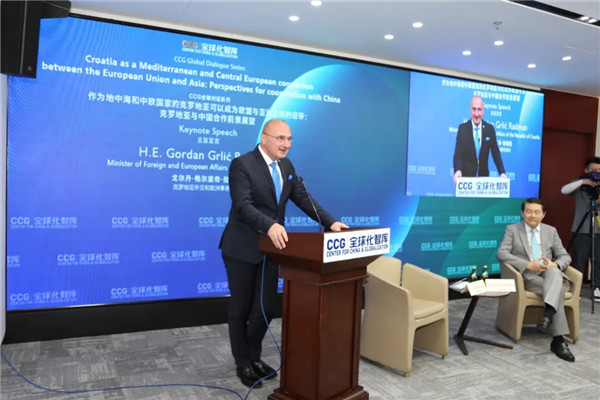
Thank you, dear Henry, if I may so say, up to so many encounters and around the world and you mentioned that. So last we met, it was in Munich during the Munich Security Conference and just a month before. And in January in Davos. And so, yeah, you visited also Croatia and you took part at Dubrovnik Forum at one panel and together with Mabel [Lu Miao] and we are missing her. And thank you so much for this and invitation.
And so I see also my colleagues and ambassadors here, excellencies whom I work with. And first of all, and I may, if I may mention that to my colleague from Socijalistička Republika Hrvatska… I prepared my speech intervention, however, but, so we will see. And probably it’s better to do with a Q&A, with a concrete and a dialogue. It’s better to have an interactive discussion. But first of all, I must and I will and I want to express my deepest impression being in Beijing and your beautiful country with its magnificent culture and history, and for the second time with my wife, she is also here, not only ambassadors and my distinguished colleagues and from the foreign ministry and, of course, my colleague and friend, Ambassador to Beijing, Dario Mihelin. Thank you also that you work together and thank you that so you establish good connections and communication with all the ambassadors here.
I am really privileged to be in front of you and to address you and some important topics regarding the, first of all, Croatia. As you mentioned, Henry, I still vividly remember by the 2023 and the Dubrovnik Forum. But so this year we had a really, and it was the best 18th edition of Dubrovnik Forum and visits by so many think tanks, foreign ministers, international representative, international organization and so on. And so you were there 2 years ago, Founder and President of CCG. And thank you very much and for participating at our Dubrovnik Forum. And this is a very engaging discussion. And also this year we had an also special representative, Chinese Special Representative, Mr. Lu Shaye, also in a panel of shifting global trade dynamics.
This is my actually first official visit to China, but my second because I was here now 40 years ago privately with my family and it’s really an honor and sa privilege to be as a foreign minister here and to see my counterpart Mr. Wang Yi. And so and we had a fruitful discussion on some very important, first of all, bilateral, economic, political and other topics of other common interest. I am really deeply honored and grateful for the opportunity and to exchange views with you on topics of great importance. I see that so it’s most the ambassadors of the European Union of our region. The region European, the regional organization, the organization and of values we share, Croatia share with.
First of all, the rule of law, fundamentals and freedom, human rights and so on. And Croatia is very honored and, of course, happy to be a member of the European Union.
At the beginning, I like also to dedicate a few words to Croatia’s journey to independence, just in a nutshell, and that then outline the core pillars of Croatia’s foreign policy and finally explore our vision for deepening our cooperation with China.
Although I’m sure that you have been briefed by our ambassador here, Dario Mihelin. In Croatia, independence started in 1991, after the brutal aggression and our freedom and sovereignty, independency was forged in Homeland War. However, our independency and proclamation of independency and came by European Union…So since 15 January 1992, Croatia is an independent recognized sovereign country. We firstly declarate our independence in 1992, our path to where we are today has not been straightforward or easy. We progressed from a country in the war to an exporter of peace and stability….
We can assess that the additional 3 decades we gained are great achievements. First of all, membership in NATO, then European Union. And now…the Croatia in are fully integrated in European Union. Having in mind that, so first January 2023, we entered the Schengen Zone and we introduced the euro as a national currency. What remains is the OECD membership, but we are on the way to fulfill all our criteria – what’s necessary for a member of the OECD as for the first half of 2026.
You mentioned also the Danube Region…Croatia was occupied. But we struggled for, fought for our independence and the peaceful integration… And then Croatia was completely liberated from rebels and from aggressor. However, now Croatia…would like to have a good relation with Western Balkan countries and to establish and to promote regional stability. It’s now our national interest.
And it is the reason why Croatia understands very much the situation in Ukraine. Ukraine has – it’s the same scenario. Croatia respect international law, sovereignty, territory integrity. And when it comes to Ukraine, we, Croatia has been with Ukraine since Day One. And Croatia will be with Ukraine also in the future. Croatia provided the comprehensive aids to Ukraine, be it financially, politically, diplomatically, and of course, also military….we offered our expertise and our experience. From Day One of the Russian invasion. We saw it to the length of our own defensive war against the Yugoslav People’s Army and neighborly aggression in the 1990s. But it was ended almost 30 years ago. But memories are still very much alive. The human and economic toll of the aggression was catastrophic for the country of our size. More than 20,000 killed or missing, more than 20% of our economy destroyed, not to mention the damaged infrastructure or mine- contaminated areas which take years to clear. So when Russia attacked Ukraine, we stood resolutely with Ukraine. As we didn’t want Ukraine to face the same fate as us while defending itself for a much stronger adversary.
That is why we immediately offer them our own support, as I mentioned, both political and material. And we strongly backed all similar diplomatic efforts. I mentioned that it was also demining and veteran care, prosecution of war criminals as well as other war related issues. And Croatia is about to organize also the International Conference on Social Assistance and Veterans in October this year. Yes, we did them also last year, the International Donor Conference. And two years ago the First Parliamentary and Crimea Platform and so on. So many conferences. Also, during the Dubrovnik Forum also are organized together with Andrej Plenković, the Ukrainian Foreign Minister. Also conference with our neighbors, Western Balkan’s Foreign Ministers. There were all 6 or their deputies and also the, with the ministries of foreign affairs of surrounding countries, there are members of the EU or NATO.
Croatia’s foreign policy goals today center around bilateral cooperation and economic diplomacy, European integration, regional stability and security, global engagement and multilateralism, protecting Croatian citizens and Croatian minority abroad. We are very proud, you know, we Croatians like to travel. So you can find Croatians everywhere or a second, third, fourth generation. Being in Australia, there are about 250,000 Australians of Croatian origins or 100 in New Zealand on the US almost 1 million. Or in Canada 400,000 and even in Latin America and also almost everywhere. Or be it in Argentina, Chile, Peru, Brazil and some also almost 1 million. And of course, the big, the large Croatian diaspora is in Germany…They are just like Croatians, they choose this value to work and to travel where they want. However, but as a country of just 4 million inhabitants, we’re not happy that so the Croatians are leaving. But however, they are also coming back after 2 or 3 years. This is the fate of every country in the European Union, for a small country and not only Croatia, but first of all eastern and middle European countries.
As I mentioned, the next strategic milestone in further solidifying Croatia’s international position remains the OECD Organization for Economic Operation to open membership. And it is not because just okay to be a member of OECD. It’s because of our citizens, because of our reforms. It’s because of the implementing the smart policies and practices from the OECD. It’s great, and it offers a good opportunity to invest…That means that it’s a really added value. At home and abroad our policies are guided by 4 overarching priorities– digital transformation, demographic revitalization, as I mentioned, is the most important topic right now, decarbonization and education. As you see also in all European countries, I can say that, so we have almost the same goals. These goals drive our growth while ensuring sustainability and resilience. And Croatia’s investments, like the LNG terminal on the Island of Krk, are now adding to strategic autonomy through energy diversification. And we are open to our technology friendly environment and… in the development of one of the fastest electric cars in the world, but we can also discuss during the Q&A also, to speak on that even much more. I can brief you on some more details regarding the energy, the verification, because it’s a very important issue today.
The phasing out the dependency on certain countries remains crucial, not only for Croatia, but for the European Union in general. So…Marco Polo was born on a Croatian island of Korcula. But first of all, central and Mediterranean alliance with the historic Silk Road. It’s not by accident that so that they came so that you mentioned that. Thank you so much. But to be honest, I want to say that they then, it was at that time part of the Venice Republic and making today’s Croatia and Italy to share his legacy. Like there are Mozartkugels between Germany and Austria. It’s good to say that. Okay. Yes. Yeah, we don’t want to say it’s only Croatian, it’s only Italian. And it’s really generous if you just share with your neighbors and with your partners, with your friends, who knows how was it 400 years ago. But we are very proud that he was of Croatian origin however. Throughout the history, the Mediterranean, you know, Croatian is a small country…We are a small country, but so we are Mediterranean, we are Middle European…Just now, if you start on a driving from Zagreb to Split– Split is the second biggest city in Croatia. But on the coast Mediterranean, you can change at least 3 micro climates. So there are Lika, it’s in the mountains, like Alpha in Switzerland or in elsewhere. But we are very proud that, so we are a small country, but with different tempers and also of the peoples there, also the history.
But expanding horizon Croatia and Asia, so we are here also because I had really a fruitful discussion with my colleague yesterday. And though geographically distant today, but as you see that it was not far for Marco Polo 400 years ago, Croatia understands the profound dynamism of the Asia and Indo-Pacific region. As conflicts in Ukraine and the Middle East continue, Central Asia remains a focal point of interest among major global players seeking both bilateral and regional coorperation with the nations of the region. Our relations with Asia are shaped by historical migrations, modern diplomacy and growing economic ties.
China is one of the key partners for our strategic projects. The Pelješac Bridge, Pelješac bridge connected the North Croatia with South Croatia. Croatia also engages with Southeast Asian nations, Republic of Korea, Japan, India, Mongolia. So in general, the Indo-Pacific area, I visited Mongolia. I visited it also at the beginning of this Asian trip.
Several factors drive this engagement. First, strategic connectivity between Asia and Europe by the development of the Trans Caspian Transport Corridor, the so-called Middle Corridor. Second, abundant energy and natural resources. Third, expanding markets. And forth, the overarching priority of global security. Croatia’s cooperation with the Asian states has intensified over the past 2 years. We have seen strengthened our of bilateral activities and a series of high level political engagements on the margins of major multilateral forums. In bilateral cooperation, we seek to enhance economic and diplomatic ties, foster scientific cooperation, exchange expertise, promotes people to people interaction while fostering interregion dialogue and understanding. Of course, we embrace Asia’s diversity and observe the needs and interests of our partners while showing the sensitivity of their political, economic and cultural specifics.
So are we a small country. So there are people who could say there are small countries, there are big countries and so on…I like this in the sentence on the it’s came from, I think so Danish Foreign Minister 2016 and so on. And he said, so look, my dear friends, there are two profiles or two types of small countries. That’s small countries and there are small countries who are not aware that they are so small. That means that, so we rely on each other, small and great or big is just in our heads. We are not small in this regard. When it comes to our dedication to the peace, to the respecting of international law, when it comes to the our pursuing our European values. We are great. We are just and only small in the size. And I think so we should stick together when it comes to multilateralism, when it when it comes to solidarity. Just a look at Ukraine. So helping, assisting Ukraine is not only just an act of solidarity. We are in the European Union, so we see that it is investment in European security and of course, an international order based on rules.
Bilateral relations with China are excellent, expanding, and it could be even more, just that we discussed it yesterday. And there’s an planned, of course, upcoming visit of my Prime Minister by the end and of the year.
What we want is not just to be quite better connected, and of course, what we want is more investments in Croatia. But we also want to see Croatian companies invest in China. And there are several opportunities these days in China.。。direct flights, I think, are necessary first of all, because it’s also in our interest to have tourists, and Croatia is a tourist-oriented country.
Of course, there is potential, as I mentioned, for economic cooperation and collaboration across numerous areas, including trade, transport, division transformation, investment, business climate, and education. We hope that the level of cooperation will intensify in the future. There are also numerous opportunities for international students to pursue higher education at Croatian universities. Many Croatian universities now offer over 100 English-taught programs across fields such as medicine, engineering, management, and tourism.
Croatia is also committed to working closely on climate change, sustainable development, and the green transition. As we know, there are ambassadors here from the European Union, it’s not necessary to repeat how important it is, especially now having in mind the multi-financial framework that must be realized and established.
I am here just two days before the EU Summit, probably by accident. So I’m not paving the way here, but of course, why not? I’m also – my country’s a member of the EU. And I am really looking forward to having a good discussion. We may have different approaches towards different topics, but we need to speak, and the channel of communication must be open everywhere, not only here.
So EU, China, despite, so as I mentioned, different political and economic systems, the EU and China have a shared interest in pursuing constructive and stable relations. I believe that maintaining dialogue is still the best way of addressing our differences in the context of polarized geopolitical environment. This approach can also decrease tensions to a certain extent. China and the EU share common interest in achieving constructive and stable relations. Cooperation with China in solving global issues remains crucial, particularly addressing global challenges like climate change and biodiversity, food security, public health, debt restructuring, disaster reduction and humanitarian assistance.
In this regard, so we expect meaningful outcomes of the upcoming EU-China summit on July 24th, marking the, of course, also 50th anniversary of EU-China diplomatic ties. China is the EU’s second largest trading partner. It should not have been forgotten, with daily trade exceeding €2 billion. Trade exchange between the EU and China remains strong and investment ties deep. We hope to achieve a balanced, reciprocal and mutual beneficial future relations with reduced trade and investment barriers, avoidance of distortive policies and rebalanced trade flows in sustainable manner..
Ladies and gentlemen, my dear colleagues, friends, as the number of interactions in our increasingly interconnected world dramatically increases, history accelerates too. We have not overcome history. Quite the contrary, we produce too much history. And sometimes it feels it’s like an divorce of abysmas when it comes to Western Balkans to produce too much history. And sometimes it feels the international system is rearranging itself too fast for the institution network to respond adequately. This is the challenge. Diplomats needs to rise to. All members of the international community, Governments and organizations, as well as enterprises have a stake and a role to play. By adding all our voices, we could be able to build a more prosperous future for all. Your nation, with its rich Silk Roads heritage and Croatia, a… gateway to Europe, reached histories of exchange and resilience. It is my hope that our dialogue today will strengthen the bonds between our nations. Let us work together to build a future defined by cooperation, mutual respect and shared prosperity. Thank you very much for your attention.
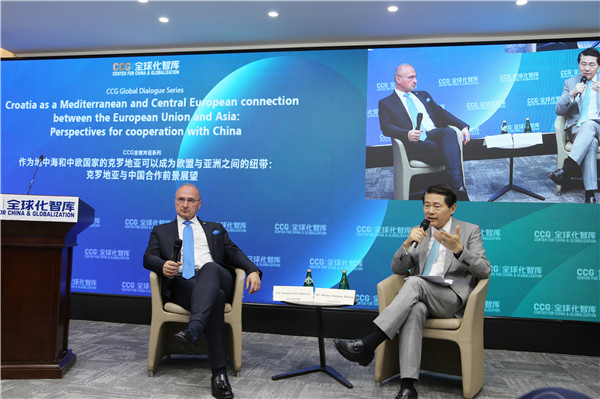
Excellent. Great. So we have heard a very comprehensive, very timely, and also very encouraging keynote by Minister Radman from Croatia.
We now have a brief dialogue following the talk. As you mentioned, this year marks the 50th anniversary of EU-China relations and diplomatic ties, half a century has passed. You also pointed out that Croatia has historically played an important role, starting with Marco Polo and even earlier. As regard of EU-China relationship, we have no border issues as being different parts of the world. But we share a long history of relations. Croatia represents itself in the EU and, as you mentioned, is also strategically located at the crossroads of the Mediterranean, Central Asia, and Central Europe.
So, how can we further strengthen China-EU relations, particularly in this time when unilateralism is prevailing? We hope that we can continue to strengthen cooperation between China and the EU, as part of the dialogue we’re having now with all the participants, including the ambassadors present here. Minister, what do you think are the key areas in which we can further enhance, improve, and enlarge China-EU relations, especially given the significance of this anniversary? Perhaps you could elaborate on that a bit more.
Of course, I know we talk about people-to-people exchanges, increasing business, relaxing visa policies to facilitate more visits, and so on. And I fully agree with you that dialogue is crucial. No matter what, we need to maintain high-level dialogue, intense discussions, and frequent visits. Your presence here in China is a great example. Whether it was coincidental or planned, I believe it is very important that you have this kick-off visit ahead of the EU-China Summit. So, on that note, do you have any further points to add on the further cooperation between China and the EU?
Yes, and you mentioned the Dialogue. Of course, dialogue is just something natural, but I also think the readiness to maintain a compromise is important. Sometimes it’s necessary. But first of all, I’m so appreciative, let’s say I’m relaxed. We are thinking out of the box. We were focused on how to get full EU membership, then enter the Schengen Area and Eurozone to be fully integrated with European Union. Now, as I mentioned, become (a member of) the OECD, it’s good that we are among the eight candidate countries. I can say we are a frontrunner because of the statistics. We completed 20 discussions, 20 committees out of 25, and we expect to formalize our plans by the end of the year. In February next year, my Prime Minister and Secretary are going to sign this agreement. But of course, all OECD countries should ratify this document, and by the end of June, we hope to be a member of the OECD.
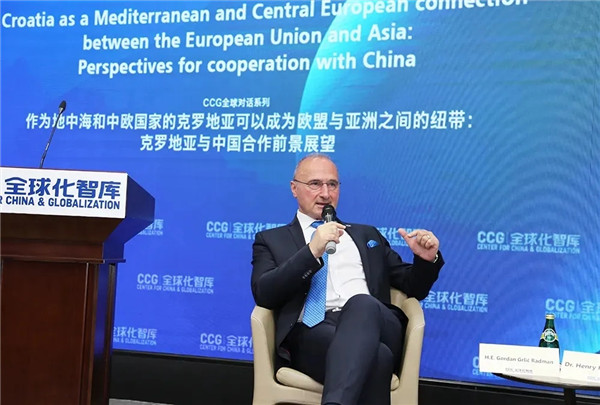
I also want to remind you of our activities toward countries like Central Asia, which I visited for the first time in December last year. I started with Tajikistan, Uzbekistan, Kyrgyzstan, and after that Kazakhstan as well. But China is, of course, the second-largest economy in the world, sharing importance with the European Union, second or third, but it’s a very important partner…
But of course, dialogue is not just an obligation; it’s about mutual respect. Dialogue means reaching a compromise where both sides achieve a win-win outcome. That means both sides are satisfied with the result, but this only works when cooperation is based on respect for rules. Rules are the foundation of how we can work together. If you look at the situation in Ukraine, for example, there’s a clear violation of international law and the UN Charter. So, when it comes to EU-China relations, there’s huge economic potential. The economy makes a meaningful approach. I see this for Croatia bilaterally as well. As I mentioned, we have many Chinese companies in Croatia, but we want fair competition. We also want to see Croatian companies operating in China.
Absolutely, I think the outlined potential and, of course, the economy in this multipolar world, or multilateralism, is facing challenges, but it’s crucial. Personally, I believe the China-EU relationship has an absolute necessity for conducting more dialogue. Croatia sets a leading example as a successful country. You joined the Schengen Area, adopted the Euro, and are on track for OECD membership, and I was so impressed when I visited your beautiful country.
The China-EU relationship is vital, as you mentioned, especially regarding the Russia-Ukraine war. I noticed that Mr. Wang Yi, at the BRICS Foreign Ministers’ Meeting, said BRICS countries could serve as pillar of peace. For the Ukraine war, the U.S. doesn’t want to send troops, so it would likely be European troops and non-European troops involved. If China can play a more active role in mediating peace, it could add significant benefits to the EU.
At the same time, you mentioned compromise. Just a few days ago, China lifted sanctions on Buetikofer, which shows things are moving forward. I hope European leaders at the China-EU Summit will prioritize this economic potential, as many Chinese companies want to invest in Europe. However, we still face challenges like sanctions. We have to re-evaluate China-EU relations. I truly hope the China-EU Summit this time, will be a great success, fostering more economic cooperation against a tariff war, trade war. Neither the EU nor China wants a trade war, so we must work together.
But yeah, so I think they send quite a big potential in China and in terms of your size and, of course, your presence in the global market. But the more we invest politically and diplomatically in this space, the more stable and independent allowing us to do more…There are so many hotspots, starting with Ukraine, and then the Middle East, and not to neglect Africa, the youngest continent. We have to be active and be present there, invest even more in peace, and to respect multilateralism, as you mentioned. So, respect—yes, respect—but we should be at a higher level when it comes to respect. It’s about mutual respect: I respect you, and of course, I expect you respect me. And that’s the only magic formula for existing in this very turbulent world.
Yes, absolutely. I was encouraged to see European countries, Canada, and others strongly condemn the situation in Gaza recently. I think China also supports understanding the two-state solution. I hope the narrative of this EU-China Summit will be positive. For example, I had Pascal Lamy here on China-EU joint ventures, with Chinese companies reinvesting in Europe and opportunities in African countries and beyond. There’s huge potential because the number of business entities on both continents is enormous, and this can benefit Africa, Latin America, and many other countries.
I really hope this EU-China Summit generates positive narrative rather than just challenges. As you said, we need to compromise. With so many EU country representatives here, I’m sure they have great ideas on how to improve this relationship.
I have one final question before I open it up to the audience.
Yes, and it’s theoretical, of course. What is an agreement? An agreement is the result of compromise…compromise is a starting point for doing something good, something better. Considering China’s permanent seat on the UN Security Council. The UN has a huge responsibility for peace worldwide. Our world is fragile but also vibrant immediate neighborhood…
Well, that’s what we have seen now, China and Europe actually voted together at the UN General Assembly on peace initiatives, while US-Russia voted together, one time. So we do have of common language. And also on multi nationalism, WTO, WHO, China donated $50 million dollar to WHO. We could work together with our European friends. So now for this one question, you’re talking about tourism. You know, Croatia is one of the best destinations, of course, China relaxed visas for European countries to visit China. So is there potential for Croatia to open visas for China’s tourists? And you know, there’s a lot of people we even see on social media promoting Dubrovnik, Croatia as globally unique. For example, they see it in Chinese TikTok, but then it’s a European EU affair, I’m sure.
Yeah, you know, the European Union is…27 countries. Yes, that’s true. We are obligated to follow European policies, but we are also very much interested regarding Chinese tourism. That’s why yesterday I mentioned the idea of establishing a direct flight. Every year, the number of tourists from China visiting Croatia is growing. We have a population of four million, while the tourists visiting Croatia each year are 20 million. It is five times.
Not to be selfish, but happy to see tourism flourishing in Croatia. Sometimes, we in Croatia don’t fully appreciate the beauty of our own country. It often takes traveling abroad to realize just how beautiful our country is. As you said, “Wow, I didn’t know this about my own country—it’s so beautiful.”…
Good. You know, we watch Chinese television during prime time almost every day. There’s often a report about how many European tourists have come to China, something like that. So, perhaps in the future, I don’t know if there could be an agreement, where tourists could just go and visit Croatia, and then have a special arrangement, so they don’t need a schengen visa or anything. Let’s make special management for that.
it’s not just during the summer. It’s extended throughout the 12-month period to receive tourists.
We hear about the complaints from Chinese that a EU visa is so difficult to get. So, but then there’s a lot tourists who want to go. So I will stop there. We have questions from the audience.
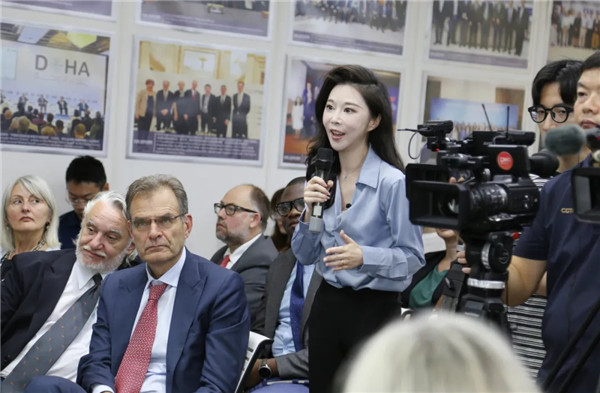
Okay, thank you so much, Henry. This is a reporter from CGTN. Thank you for your time, Minister. We have 2 questions. The first one, may I? That’s so kind of you. So the first one is regarding the meeting with Mr. Wang Yi on Monday. So how will you comment on the results of this visit to China?
And the second one is, of course, China and Croatia have continued to deepen cooperation in recent years, especially in trade and economy. And actually the completion of the Pelješac Bridge, for example, has been a great example of the pragmatic cooperation between the two sides. How do you see the future prospects of cooperation between China and Croatia? And, even more broadly, the cooperation between China and Central and Eastern Europe? Thank you so much.
Thank you so much for this. I like this question very much. I can say it’s really a shame that I am already 6 years a minister, this is my first visit to China. I don’t want to complain – not about the ambassador. He wanted me to come even earlier, but we had the pandemic and COVID, and during the EU presidency, we faced many challenges. Unfortunately, we finished our EU presidency, but through our cooperation and communication, we were forced to adopt new forms of communication and cooperation.
But truly, I am so happy to be here, and I can honestly say that Croatia’s success is also due to our honesty. Croatia has never had a hidden agenda in the pocket or anything like that. Everything we’ve wanted to achieve because of our readiness and dedication. We worked hard to achieve what we have, and I believe that if someone sees Croatia as a success story for the region, then I’d say it’s true that hard work pays off. As for the invitation, it’s of course open-ended invitation for you and for my counterpart, Wang Yi. He promised me that he would come over and take part in the Dubrovnik Forum, and we look forward to a return visit to Croatia as well.
The second question is about the huge potential I see between our two countries. As I mentioned today, there are some Croatian companies here. We are about to organize a business forum by the end of the year. My Prime Minister will be coming here with some other ministers, particularly from the economy, energy, and education sectors. There are many areas of common interest, and I believe we should focus more on these fields…
And so given our geopolitical position, we are very happy to be there. Croatia can offer to everyone as an entry point to the European market. If you look at the Adriatic Sea, we have 6 strategic ports, with the largest one being Rijeka. There’s also the historical 19th-century railway from Budapest to Rijeka, built in 1878. Rijeka was an important port, and today, there’s the island of Krk, the largest Croatian island is very close to Rijeka.
The LNG terminal wstarted to be operational since January 2021. At that time, we knew that we had to be dedicated to energy diversification, before the Russian aggression against Ukraine. Because of this situation, our government decided to double its LNG capacity up to 6.1 BCM. Besides the LNG terminal, there is also on the island of Krk the Adriatic Early Pipeline, which can supply the Western Balkans, our countries, regions, our neighbors in Hungary, and even Slovakia, Slovenia and the Czech Republic. We’ve offered our energy resources to everyone. Croatia is becoming an energy hub.
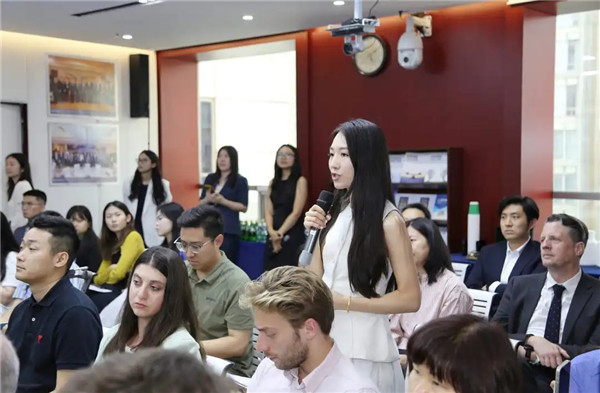
Hi, good afternoon. Thank you very much, Mr Radman. So my question is, I think lately we have observed that song, you know, European maintains also observe that the EU strategy towards China is shifting from the so-called derisking to a more nuanced approach of re-engagement. So what is Croatia’s perspective on EU’s adjustment of its e-risk strategy towards China?
Let’s see on the 24th of July. But I am very positive and optimistic in this regard. It is now in the interest of the European Union, and of course, also vice versa in China. We see China as a respectable and remarkable country with great potential. Not to mention that China is of second or third place in the world… We also need to realize that the world has become a small village, and we should rely on each other. And of course, if you see the future for the next generation, and we should invest even more politically, diplomatically. And so everything, what just could ensure that this world will exist.
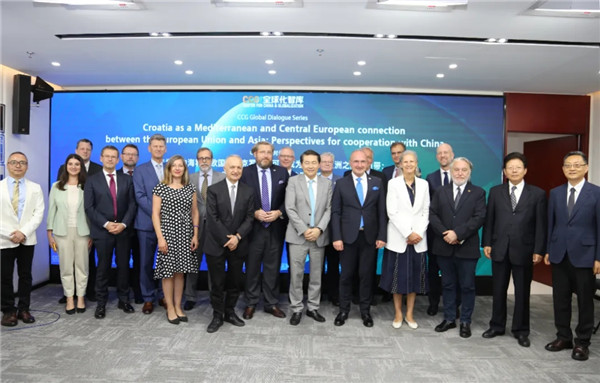
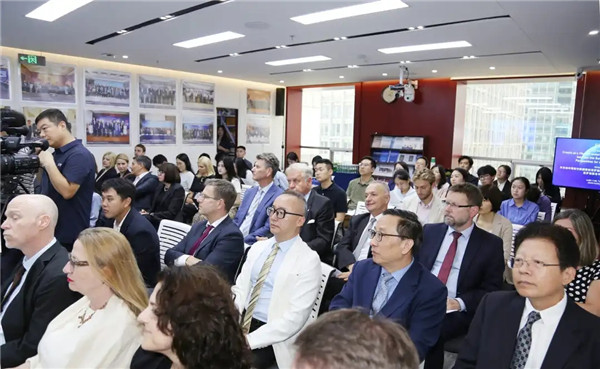
Note: The above text is the output of transcribing from an audio recording. It is posted as a reference for the discussion.
Topical News See more

